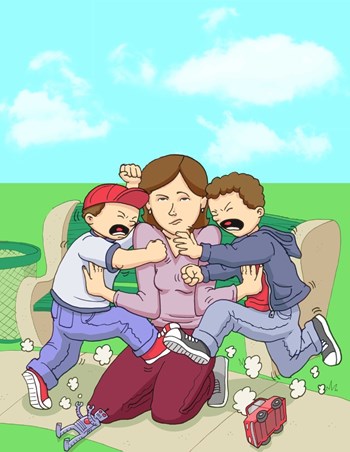
Finding the right balance of involvement between HOAs and condo boards and residents can be like maintaining a healthy relationship with a significant other—you want to be compassionate, responsive and attentive, but not too needy, nosy or aggressive.
With our busy and hectic schedules, association boards might run the risk of being apathetic and disinterested in the status and well-being of the building, leading to unbalanced reserve budgets or broken lights in common areas.
While this lethargy can be an annoyance to those who would like a more dynamic and proactive voice regarding the comfort of their home, the opposite side of the spectrum can also be cause for serious concern. An association board of trustees that oversteps its boundaries, intrudes on the privacy of individual residents and pushes the legal envelope can cause internal sickness, leading to tension, arguments and the end of what should be a long relationship life span.
Power to the People?
The extent of power boards of trustees have over the communities they govern does not have to be a mystery, Stephen Marcus, a partner with the law firm of Marcus, Errico, Emmer and Brooks, P.C., in Braintree, Massachusetts, explains. “Board powers are spelled out in the condominium documents—usually the trust or bylaws in Massachusetts and to some extent by state law.”
While basic position requirements are laid out in the association’s documents, Jane Bolin, founding partner of PeytonBolin PL, a national community association law firm with offices in Tampa, Fort Lauderdale, New York City and New Jersey, finds that a lot of board members do not fully grasp the responsibility their positions require. “I think most boards don’t understand that they’re actually running a not-for-profit corporation, so they treat it likes it’s a volunteer position that doesn’t have these fiduciary duty ties to it.”
This unawareness, she says, is the underlying cause for a lot of board dysfunction.
What are the Symptoms?
Some of the most common kinds of dysfunction residential boards are prone to are usually based around the interpersonal relationships between members and the varying (and sometimes clashing) personalities of individual residents.
Steven Weil, PhD, EA, LCAM, president of Fort-Lauderdale-based Royale Management Services, has seen his fair share of recurring conflicts on boards. So much so that he’s established his own set of Jungian-like archetypes.
The Ghost
Despite the name, the only ghoulish thing about the Ghost is his or her complete lack of involvement or interest.
“When you send communication to the board, you never really know whether he actually got it, because you never hear a response,” Weil says. “No matter when you schedule a board meeting, he’s never there. And we kind of think of those guys as the ones that wanted their name on the letterhead—that’s an issue. If you’ve got a strong board where you’ve got three people on a five-member board that are already pretty good at getting together and making a decision, it’s not really a problem. It’s an issue when you’ve got a board that’s split, and the guy in the middle just doesn’t show up ever to break the tie.”
The Friendly
While friendliness is always an added bonus, it shouldn’t get in the way of making decisions. “There's the split board: We’re five members, and two on the left, two on the right, and one who wants to be everybody’s friend and hence never makes a decision with either side,” Weil says. “We call that guy ‘The Friendly.’ ‘I’m friendly with everybody—I don't want to piss anybody off. And I can see it from both sides, but because I'm not willing to take a side, a decision never happens. And we just go on discussing the same thing meeting after meeting until hell freezes over,’” Weil says, explaining the inner dialogue of this kind of trustee.
The King
With a his or her God complex, it’s easy to confuse The King with Kanye West. As Weil explains, The King maintains the belief that, “ ‘I’m the president, which makes me God, and I get to decide when the meetings are. I get to decide who speaks at the meetings.’ ”
He says, “In many cases, these are people with strong personalities that, whether the rules are with them or against them, can run over everybody else in the room, including their fellow board members. Sometimes just their presence is intimidating—sometimes intended sometimes not.”
The Pleaser
Compromise is essential in every relationship, boards included. But there’s a limit. Trying to please everyone is a fruitless pursuit that will only limit decision-making.
The Pleaser operates under the idea that, “‘Every time something comes up, we should poll the unit owners, we should see what the unit owners think. Let’s see if we can get everybody on our side before we do anything.’” And that often means that you don’t get stuff done that needs to be done,” Weil says. “Plus, unit owners aren’t in the same position necessarily as a board member. They’re not required to take the time to learn all the facts that go with an issue, and to make the informed decision based on the material that board members are presented with.”
Troublemakers like the above can mean that quarterly meetings get very awkward, or it could be more damaging. When the board no longer functions properly, the community it’s supposed to govern can quickly devolve into a hectic mess. Depending on the level of dysfunction, these issues can cost associations extra time and money, can delay projects and ultimately, force a management company to quit, as Robert Kravets, CMCA, PCAM, the president of Realty Corporation of Massachusetts, Inc. in Needham, Massachusetts, knows from experience.
“Things start to fall apart if the center does not hold. Things don’t get done and people get aggravated and they don’t understand why,” Kravets says. “Eventually, there’s a revolt. Maybe the manager gets fired; maybe the board of trustees gets fired. Different people get on the board and the ball starts all over again.”
Beyond interpersonal drama, there can be legal ramifications and financial loss associated with a board in peril. According to Bolin, a defective board can lead to an increased number of potential claims of breach of fiduciary duty and/or possibly violation of various state and federal laws concerning the unit owners’ rights to use and enjoy their property.
And although it’s hard to hold a trustee or a board member personally accountable due to the business judgment rule that protects members unless their actions are criminal, they can still suffer the ramification of litigation because all residents, including trustees and board members, are impacted when a community is sued.
Treatments and Remedies
Much like heart disease, lack of focus is the silent killer of board productivity, so a main priority should be prioritizing issues, Kravets stresses.
“A lot of times it is focus [problems]—that’s what I’m dealing with mostly these days, a lack of focus, and I suppose apathy,” Kravets says. “The apathy is also a function of lack of focus, so what ends up happening is you have a board that decides that the most important thing that they want to deal with is that somebody parked their car inappropriately versus the important issue that they need to deal with which may be a large drainage issue on the property or some capital components failing. They just don’t focus on the right thing. They get very hung up on minutiae instead of dealing with the larger issues that confront them.”
Lack of focus and lack of knowledge often go hand-in-hand, as focus problems tend to stem from a board feeling overwhelmed by predicaments they aren’t quite sure how to remedy, Kravets explains.
”I think that many, many, many trustees are out of their depth with building operations and maintenance and repair items,” Kravets says. “If it’s not a simple fix or a straightforward, ‘Yeah I just replaced the door,’ or ‘Go fix the pump,’ then the issue goes right over their heads,” Kravets says. “I think it’s easier for people in general to deal with what they understand and know or what annoys them versus tackling a large complex issue that involves strategizing over how you’re going to move forward with it and the funding of it. Problems exist for long periods of time instead of being dealt with on a proactive basis. That exacerbates the problem,” he says.
Because ignorance and confusion further perpetuate disordered boards, especially when it comes to planning community projects, Kravets ensures he provides his clients with adequate resources and education. A little extra one-on-one time with a manager can mean avoiding utter disaster.
“I suppose the best thing property managers can do is keep trying to refocus them and give them the information they need in order to make intelligent decisions. Keep pushing the envelope. Keep refocusing them on their own documents.”
Marcus also suggests boards use all available resources and consult their attorneys, accountants and all other applicable advisers in addition to their manager.
After years of experience in dealing with less than harmonious boards, Bolin was inspired to create Peyton Bolin MBA: Mastering the Business of Your Association. The program, which will officially launch in December, addresses why associations should view themselves as businesses and how adopting this perspective will benefit their communities. The customizable program is comprised of several learning modules addressing topics such as creating a mission, vision and values, defining board member goals and responsibility, how to transition new members and legal obligations and requirements for associates in the state of Florida.
And sometimes, when all else fails, it just takes hitting rock bottom for a board to get the self-motivation needed to regain alignment, and ultimately, functionality.
“They need to get to nothing and say, “OK we have to create a plan of action together,’” Bolin says. “They made a commitment. Going to a board meeting once a month or once a quarter, if they think that’s their commitment, that’s not their commitment, that’s just the meeting. They need to actually schedule some time to get together and I would say a strategy session. What are the goals we want to accomplish? What are the issues?”
“Because right now,” she continues, “what I experience is that they’re constantly doing what’s next. Think and plan and actually look at the big picture and focus on what needs to be happening now instead of always putting out fires,” Bolin says.
Enjolie Esteve is an editorial assistant at New England Condominium.






Leave a Comment